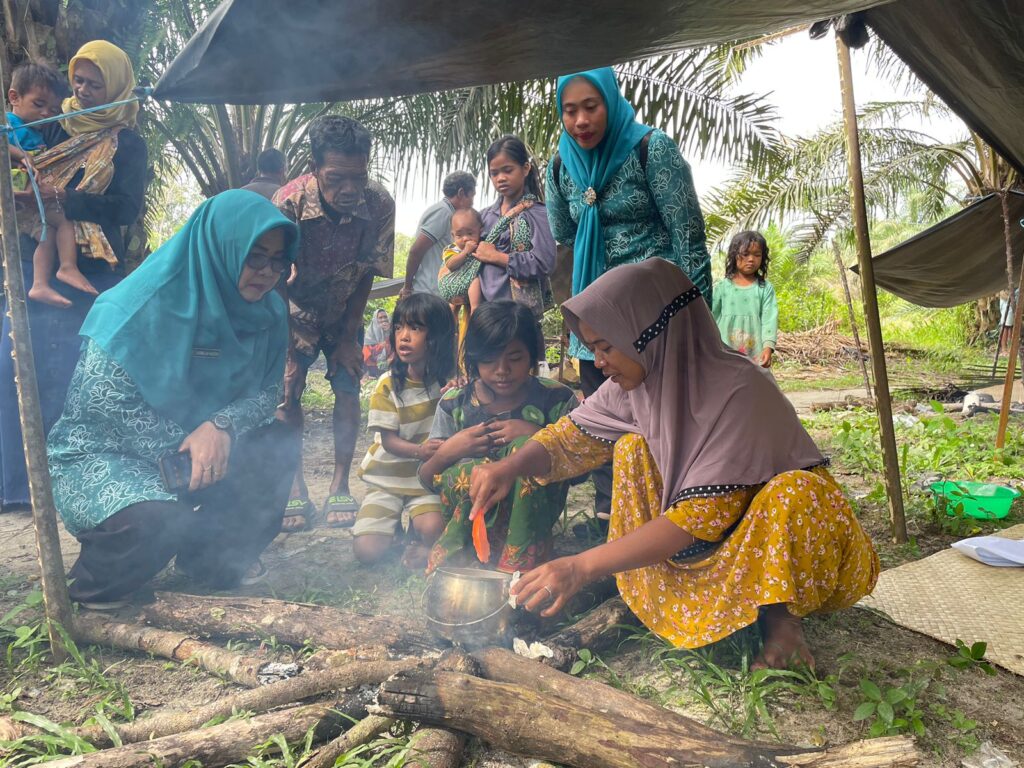In an effort to support local wisdom in the Suku Anak Dalam (SAD) community, Pundi Sumatra in collaboration with the Pelepat District PKK held an educational activity on the use of local food. This activity also functions as a campaign to promote processed forest food products made from tubers. Supported by Partnership Partnership, this program aims to identify and revive local food sources of the Anak Dalam tribe.
Before knowing instant food products, the Anak Dalam tribe community met their carbohydrate needs from tubers obtained from around the forest. Some types of tubers include bana, gadung, and sweet potatoes. However, with the decreasing forest area, access to these local food sources has become increasingly difficult. In addition, these types of tubers have not been widely cultivated by the Anak Dalam tribe community. As a result, the community is increasingly accustomed to packaged foods that can be consumed instantly. Although processing tubers such as bana or gadung takes time and a fairly complicated process before they are safe to consume.
This educational campaign involved various parties, including the SAD community, village PKK, sub-district PKK, and was attended by the Bungo Regency PKK. The campaign participants consisted of five groups consisting of mothers and teenage girls from representatives of the SAD group. There were also representatives from Dwi Karya Bakti Village, Pasir Putih Village, Pelepat District, Bungo Regency.
Each campaign participant was given about two hours to prepare their chosen menu. Sri Bungo, one of the participants, shared a story about the processed menu that her group made. "We use gadung, we want to fry it into crackers. In the past, it was made like porridge," she said. Sri Bungo also explained that processing gadung until it can be eaten takes quite a long time. Peeled gadung must be soaked on land for three days. After that, it is washed clean in the river with running water for a day. After that, the gadung is dried for two days. "Because the processing process takes a long time, we rarely eat gadung, at least once a week," she continued.
Most of the menus produced are in the form of porridge, which the SAD community calls jungle rice because the ingredients are taken from the forest. Yeni, one of the participants, recalled her childhood when they often ate jungle rice without thinking about health problems. "When we were little, we often ate this. No one ever had a stomach ache, or ulcers like the villagers. So we didn't mind eating only once a day. But now our children often get stomach aches," she said.
Darmalita, as the Head of Pelepat Subdistrict, also had the opportunity to provide education about healthy food to the SAD community. In her presentation, Darmalita appreciated the ability of the SAD women's group to produce healthy food for their families by utilizing forest products. "The parents here certainly understand that the bana, gadung and sweet potatoes that we currently process have the same value as rice. "This means that if we don't eat rice, it won't have a bad impact on us," he said. Darmalita also recommended that the SAD group add vegetables to each side dish served to complete the source of nutritional intake.
After the discussion and sharing session, the participants enjoyed the processed food together. This campaign is an opportunity for the SAD women's group to reintroduce traditional food from their ancestors. Yori Sandi, as the coordinator of the Estungkara program, hopes that this activity can strengthen the existing knowledge in the community. It also increases awareness that local food is rich in nutrition, economical, and healthier than packaged or instant food. "In addition, we want to promote the culinary specialties of the SAD community that may have been forgotten," he said.
With activities like this, it is hoped that the SAD community can continue to maintain and utilize the natural resources they have. This program is also real evidence that local wisdom and traditional knowledge have an important role in maintaining food security and community welfare.


